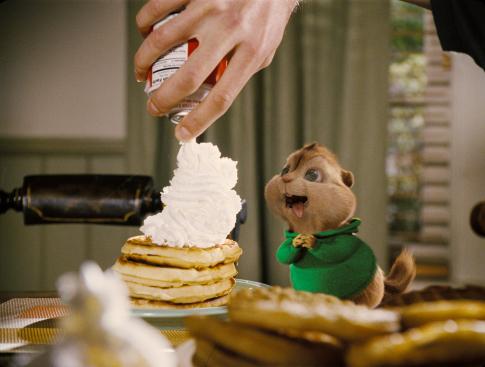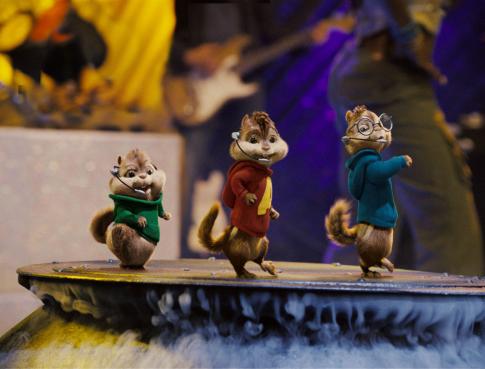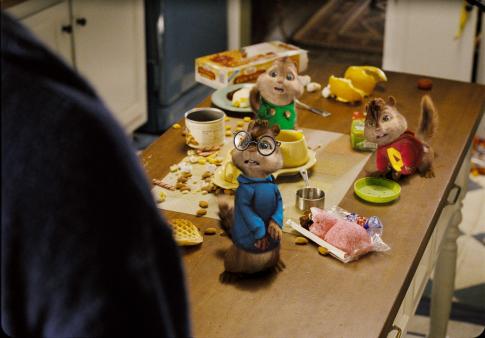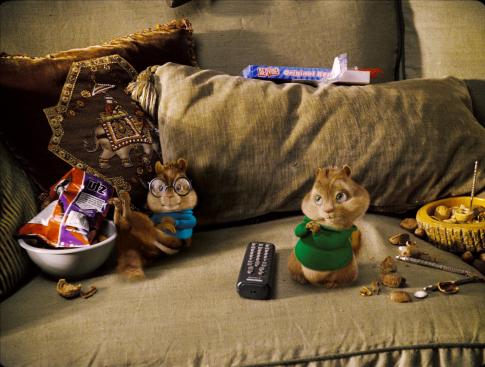Synopsis
Amidst the enchanting world of Los Angeles, three charismatic chipmunk brothers—Alvin, Simon, and Theodore—find their serene tree home abruptly transformed into a bustling journey toward stardom. When their tree is sold to become a festive Christmas decoration at JETT Records, fate introduces them to Dave Seville, a songwriter grappling with his precarious career. As luck would have it, the chipmunks inadvertently hitch a ride to Dave's life inside a muffin basket, injecting an unexpected vibrancy into his otherwise predictable existence.
Initially taken aback by these extraordinary visitors, Dave plans to send the chipmunks on their way. Yet everything changes when he hears their mesmerizing rendition of "Only You (And You Alone)" alongside a spirited take on "Funkytown." An unexpected alliance forms, with Dave offering the chipmunks shelter in exchange for their musical talent. With a newfound sense of purpose, Dave pens the festive anthem "Christmas Don't Be Late," hoping it will propel them all to new heights. Unfortunately, an attempt to introduce the chipmunks to Ian Hawke—a record executive and Dave's college acquaintance—proves disastrous when nervousness overtakes the young performers.
Both comedy and calamity find Dave in rapid succession, muddling his work and personal life as the chipmunks' antics inadvertently cost him his day job and make a mess of a dinner date with his ex-girlfriend, Claire. Yet as the bond between Dave and the chipmunks grows, so does their success. Their defining moment unfolds when they charm Ian and his guests with a soulful rendition of Dave's song, turning the chipmunks into an overnight sensation. But as the allure of fame encroaches, Ian attempts to manipulate the situation, coveting the chipmunks' talents for his gain.
Amidst a whirlwind of performances and pressures, the chipmunks, misled by Ian's smooth talk, begin to doubt Dave's intentions. A misinterpreted letter leads them into Ian's grasp, where they are worked relentlessly, their newfound fame spiraling into exploitation. Unfazed, Dave remains determined to save these unexpected companions from a life of overindulgence and exhaustion. Claire's assistance becomes vital once more as they uncover Ian's deceptive plans and successfully infiltrate the renowned Orpheum Theatre.
On stage, the chipmunks uncover the truth and decide to reclaim their destiny, subverting Ian's plans in a riotous, unforgettable performance. Despite Ian's desperate attempts to maintain control, the chaos crescendos, leading to an unexpected escape that topples Ian's reign over the music scene. With hearts full and their voices free once more, the chipmunks and Dave embark on a new chapter, one built on genuine camaraderie and creativity, leaving behind the glittering facades of fame.
Argument
In the whimsical tale of , the journey of three vocally gifted chipmunk brothers, Alvin, Simon, and Theodore, begins amidst the towering forest, where their home—a modest yet extraordinary fir tree—is abruptly uprooted when purchased by JETT Records as a festive addition to the holiday season. Transporting the essence of these talking creatures into bustling Los Angeles, this seemingly innocuous event sets the stage for a dramatic unfolding of events that cleverly juxtaposes themes of fame, innocence, and the dynamics of trust and betrayal. The narrative cleverly intertwines their adventures with those of Dave Seville, an aspiring songwriter whose aspirations have been consistently thwarted by the merciless whims of the music industry.
The film offers an insightful critique of the music business through the portrayal of Ian Hawke, a manipulative CEO at JETT Records, who, despite being a former college roommate of Dave, dismisses his latest music demo, bluntly advising Dave to cease his songwriting endeavors. This rejection sets the stage for the chipmunks’ unplanned venture into Dave's life. As the trio unwittingly stows away in a basket of muffins carried by Dave from Ian's office, fate orchestrates a serendipitous encounter that will alter the trajectory of their lives and illuminate pressing questions about the price of ambition and the essence of genuine artistry.
Upon discovery of these animated stowaways in his home, Dave's initial reaction is one of disbelief and he promptly expels them. However, their melodious renditions of "Only You (And You Alone)" and "Funkytown" coax Dave into reconsideration, establishing a symbiotic relationship based on mutual benefit: safety and sustenance for performance. As Dave composes a song tailored for their unique talents, "Christmas, Do Not Be Late," an interesting facet of the narrative emerges where the allure of celebrity is balanced by the innocence and vulnerability of the Chipmunks who find themselves in the throes of ambition and artistry.
The story further explores the burgeoning talent of the Chipmunks, whose initial challenges such as crippling stage fright are symptomatic of their unpreparedness for the limelight as demonstrated during an ill-fated attempt to impress Ian. This is compounded when the unassuming rodents inadvertently destroy Dave's advertising presentation, resulting in his loss of employment and compelling the audience to reflect on the chaotic impact of their presence. The film uses this moment to highlight the sometimes-disastrous consequences of sudden lifestyle changes, reinforcing Dave’s frantic but earnest efforts to balance his deteriorating relationship with Claire, his ex-girlfriend, alongside his burgeoning responsibilities.
As the narrative advances, the Chipmunks' rise to stardom is meteoric, notably solidified by their captivating delivery of "Witch Doctor," a performance that captures the public’s imagination. Yet, their newfound fame becomes a double-edged sword when Ian, motivated purely by greed, entices the chipmunks with glowing but hollow promises, claiming that Dave significantly underestimates their potential. This calculated manipulation severs their bond with Dave, enticing them into Ian’s luxurious albeit exploitative domain.
Ian's exploitation of the Chipmunks portrays a stark reality of fame—a cautionary picture painted with precision, where the vulnerable are easily ensnared in a world that thrives on image over substance. The Chipmunks, now caught in a whirlwind cross-country tour that leaves them exhausted and their voices strained, experience first-hand the darker side of celebrity. Ian's relentless pursuit of profit, epitomized by his intentions for an international tour, signals a decisive moment where the narrative prompts an examination of the ethics of entertainment and the welfare of performing minors.
Dave's determination shines through as he resolves to liberate the Chipmunks, undeterred by the spectacle of media announcements. The story culminates at the Orpheum Theatre, underscoring the pivotal intersection of truth and ambition. The intervention of Claire provides Dave with a clandestine entrance, rekindling cooperation born out of concern for the chipmunks’ welfare. However, it is at this critical juncture that the Chipmunks themselves evolve, realizing the deception they have been ensnared in, and deciding to use their resourcefulness to orchestrate on-stage havoc as an act of rebellion against their disingenuous manager.
The final act drives home the inherent themes of integrity and the value of authentic relationships over superficial allure. Dave's unwavering resolve to rescue the chipmunks pays off, albeit amidst chaotic scenes of security intervention and high-speed chases, symbolizing the tumultuous but ultimately triumphant fight for agency. The story fittingly concludes with the chipmunks’ return to Dave, a narrative device that not only restores equilibrium but also strips Ian of his false edifice, leaving him careerless and broke—a cautionary conclusion that asserts the core morality of the tale.
In summary, transcends mere entertainment, providing a narrative enriched by a multifaceted exploration of ambition, betrayal, and redemption. Through character evolution and complex relational dynamics, the film serves as a suggestive commentary on the cultural pitfalls that accompany fame and the triumph of sincerity, empathy, and personal growth. Importantly, it illustrates the overarching power of music as a universal language while also offering reflection on the ethical responsibilities of those who hold the reins of young talent’s futures.
Cast

Jason Lee
Dave

Ross Bagdasarian Jr.
Alvin

Janice Karman
Theodore

David Cross
Ian

Cameron Richardson
Claire

Jane Lynch
Gail

Justin Long
Alvin

Matthew Gray Gubler
Simon

Jesse McCartney
Theodore

Allison Karman
Female Intern #1

Tiara Parker
Female Intern #2

Kira Verrastro
Female Intern #3

Veronica Alicino
Amy

Beth Riesgraf
Mother in Store

Adriane Lenox
Vet

Don Tiffany
Engineer

Lorne Green
Director

Kevin Symons
Ted
Multimedia













